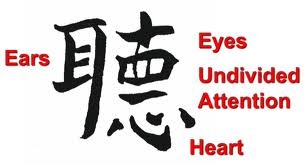
If you’re not practicing active listening, you’re missing out on more than you think.
Want to become a better communicator, particularly when you are engaged in a sensitive issue or a conflict? Then become a better listener.
Why? Because people can tell when you’re not really listening. And when you don’t listen, they feel resisted. And when they feel resisted, they:
- Feel compelled to keep repeating whatever they felt wasn’t acknowledged.
- Escalate with stronger, more emotional language.
- Become more accusatory.
- Start seeing you as the enemy.
- Become more fixed and rigid in their positions, and less open to alternatives.
Think about the times when people were only half-listening to you, clearly thinking about other things or just waiting for their turn to speak. How about the last time you argued with someone? Was the person concentrating on trying to understand your position, or was he or she giving you a blank stare while feverishly formulating a response that could win the argument? Are you guilty of doing the same?
The U.S. Department of State shares on its website four excellent rules for active listening:
1. Seek to understand before you seek to be understood.
2. Be non-judgmental.
3. Give your undivided attention to the speaker.
4. Use silence effectively.
1. Seek to understand before seeking to be understood.
When we seek to understand rather than be understood, our modus operandi will be to listen. Often, when we enter into conversation, our goal is to be better understood. We can be better understood, if first we better understand. With age, maturity, and experience comes silence. It is most often a wise person who says little or nothing at the beginning of a conversation or listening experience. We need to remember to collect information before we disseminate it. We need to know it before we say it.
2. Be non judgmental.
Empathetic listening demonstrates a high degree of emotional intelligence. There is a reason kids do not usually speak with adults about drugs, sex, and rock and roll. The kids already know what the adults have to say. Once a child knows your judgment, there is little reason to ask the question unless the intention is to argue. If we would speak to anyone about issues important to them, we need to avoid sharing our judgment until we have learned their judgment. This empathetic behavior is an indicator of emotional intelligence.
3. Give your undivided attention to the speaker.
Absolutely important is dedicating your undivided attention to the speaker if you are to succeed as an active listener. Eye contact is less important. In most listening situations people use eye contact to affirm listening. The speaker maintains eye contact to be sure the listener or listeners are paying attention. From their body language the speakers can tell if they are speaking too softly or loudly, too quickly or slowly, or if the vocabulary or the language is inappropriate. Listeners can also send messages to speakers using body language. Applause is the reason many performers perform. Positive feedback is an endorphin releaser for the giver and the sender. Eye contact can be a form of positive feedback. BUT, beware that eye contact can also be a form of aggression, of trying to show dominance, or forcing submissive behavior when used in a negative manner.
4. Use silence effectively.
The final rule for active or empathic listening is to effectively use silence. Too often a truly revealing moment is never brought to fruition because of an untimely interruption. Some of the finest police interrogators, counselors, teachers and parents learn more by maintaining silence than by asking questions. As an active or empathic listener, silence is a very valuable tool. DO NOT interrupt unless absolutely necessary. Silence can be painful. It is more painful for a speaker than for a listener. If someone is speaking, and we want them to continue talking, we do not interrupt. Rather, we do provide positive feedback using body language, eye contact, and non word sounds like “umh, huh”. Silence is indeed golden especially when used to gather information as a listener.